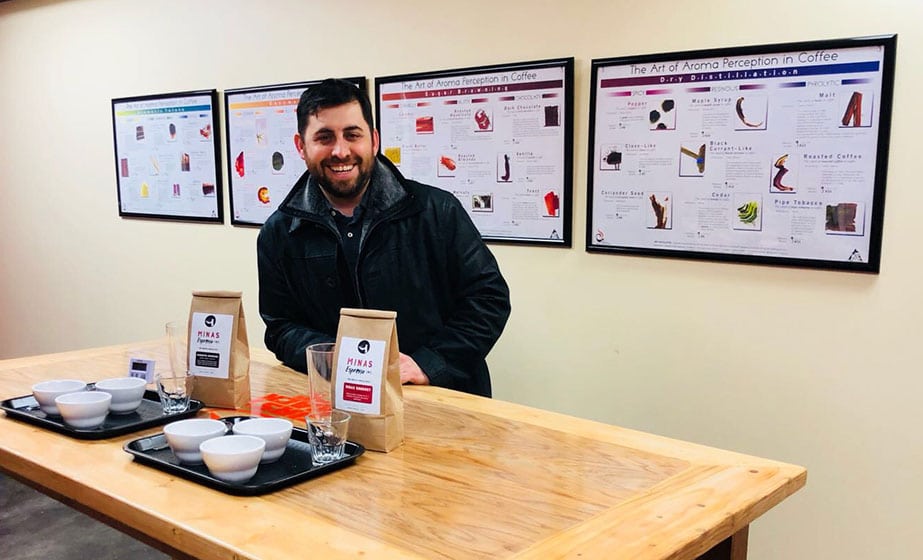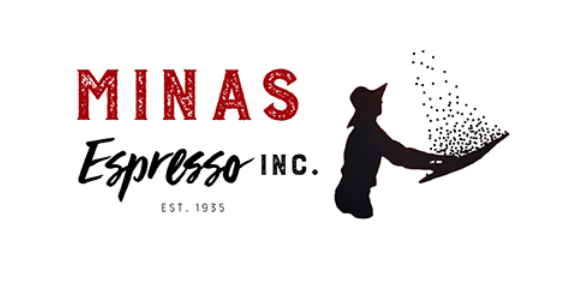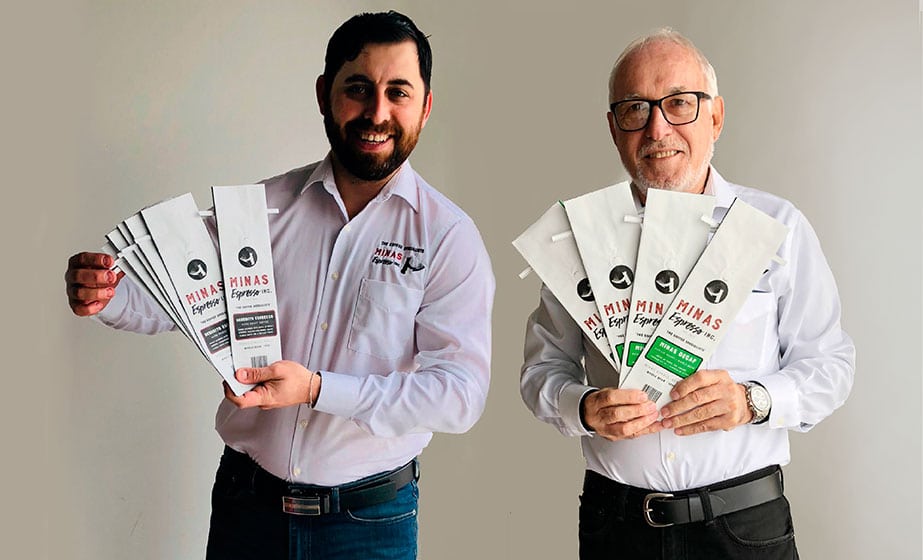
Bruno Nobre
 Bruno Nobre knows exactly what making an investment can initiate. Driven by a desire to offer a better situation for his family on their farm in Brazil, Nobre started his own coffee importing company after moving to the United States, conducting his business with caution and every consideration for others. As a result of this commitment to his family farm and other small farmers, Nobre is utilizing St. Louis as his base for a long-term, fair-trade, global coffee market.
Bruno Nobre knows exactly what making an investment can initiate. Driven by a desire to offer a better situation for his family on their farm in Brazil, Nobre started his own coffee importing company after moving to the United States, conducting his business with caution and every consideration for others. As a result of this commitment to his family farm and other small farmers, Nobre is utilizing St. Louis as his base for a long-term, fair-trade, global coffee market.
Since growing up on his grandfather’s coffee farm in Minas Gerais, Brazil, Nobre left to study at Sao Francisco University in Campinas as a part of their very first mechanical engineering class in 2001. The farm never really left Nobre’s mind: “In my mind, I always loved mechanical engineering because being on the farm. I was always working with machines. I saw my grandpa, my father, everyone around the farm always fixing stuff, taking engines down from tractors and fixing all kinds of things. I became passionate about that.” During his studies, Nobre also worked for three different international automotive companies to support himself financially in addition to the help he received from family. In 2005, Nobre and his long-time partner at last got married, and he developed a very close relationship with his father-in-law Norberto Torres (who later on became his business partner) after the passing of his grandfather. The farm switched hands between family members, Nobre was not as closely connected as he began several new chapters in his life, and he found it more and more difficult to help out during such an unsure and unstable economic situation for the country.
Later on as his courses were rounding out, Nobre and his wife were asked to participate for two years in an inter-company exchange from 2008 to 2010 in South Africa. The couple and their two kids took this opportunity to travel, learn better English, and experience a new culture while Nobre and his wife both developed their professional careers. However, Nobre’s traveling did not stop when he got back. After those two years in South Africa, they returned to Brazil with a better ability to speak English, and Nobre began a new job managing innovation as a mechanical engineer with TI Connectivity Electronics. He took on more responsibilities, managing branches and projects to Europe and Asia for his new company, and remarks “I actually was getting tired of moving around so much. I was traveling about 80% of my time during those 3 or 4 years.”
 In 2015, Nobre decided to slow down and find a new path in the United States. He followed his wife who received a promotion and was asked to move to St. Louis on an L1 visa. Bruno found a new job, and still continued to travel often. In fact, he was on a trip to Chile to investigate the scope of a potential project for his new employer Masonite when he took some personal time to head back and visit the farm. “I had three weeks to myself and I went back to the farm and I was talking to a friend. I saw how the situation was there and so I started planning how I could build a line from Brazil to the US and import the coffee.” Nobre shared his idea with his father-in-law, Torres, who helped him create his business plan and start making investments to form their own coffee importing company. “At the time I had no business plan, just this crazy idea. So then we started talking and when I came back to the US I started looking at every detail for the warehouse, distribution, investments we would need.” Nobre and Torres officially began the paperwork and first steps of Minas Espresso Inc. in 2017, and became operational just one year ago.
In 2015, Nobre decided to slow down and find a new path in the United States. He followed his wife who received a promotion and was asked to move to St. Louis on an L1 visa. Bruno found a new job, and still continued to travel often. In fact, he was on a trip to Chile to investigate the scope of a potential project for his new employer Masonite when he took some personal time to head back and visit the farm. “I had three weeks to myself and I went back to the farm and I was talking to a friend. I saw how the situation was there and so I started planning how I could build a line from Brazil to the US and import the coffee.” Nobre shared his idea with his father-in-law, Torres, who helped him create his business plan and start making investments to form their own coffee importing company. “At the time I had no business plan, just this crazy idea. So then we started talking and when I came back to the US I started looking at every detail for the warehouse, distribution, investments we would need.” Nobre and Torres officially began the paperwork and first steps of Minas Espresso Inc. in 2017, and became operational just one year ago. 
“Everything is new and it’s really hard to understand. That is the most difficult part: to understand, to figure out and to find someone you really trust who can help you.” Nobre spoke at length about his struggles getting to a jumping off point for his company, filling out documentation and also his concerns. “I dig into information and research to make sure everything is above board. It is time consuming and if you do anything wrong you can ruin the whole begging of your dream.” While Nobre found it hard to trust a stranger with his dream to open a coffee importing business, he knew he would need someone to give him guidance on the marketing, legal and accounting aspects of the business. Then, Bruno met Betsy Cohen, the executive director of the St. Louis Mosaic Project, at an event in Venture Cafe. Cohen was able to use Mosaic’s vast networks to provide Nobre with the resources and information he had not had been able to access, so he could reach out and find people whom he could trust with his dream and his company.
One of these connections, the Hispanic Chamber of Commerce, helped Nobre to get his foot in the door of Schnucks and really kick-off the market for green bean coffee and roasted coffee in the Midwest region. Nobre expects Minas Espresso to be on shelves of Schnucks in October, and further expand to Dierbergs next February. Nobre states how he values being located in the St. Louis region over other coastal locations because of the wide radius it allows his distribution centers to access, and the further reach it lends to his business. The company also conducts some of their current sales over Amazon which has recently been on the rise. Nobre plans to boost Minas even more through raising awareness and interest through social media platforms. “It’s the feeling of seeing your dream coming true. The feeling I can’t describe, I can’t put a word for it.” Now, Nobre is sharing his dream. In the near future, Minas Espresso Inc. will announce its newest business partner Mauricio Silva, another Brazilian immigrant to St. Louis. This partnership not only strengthens his business by keeping a St. Louis base, but it also exemplifies Nobre’s pledge to create a welcoming atmosphere for others in the coffee market.
But Nobre is not just investing for himself. Nobre’s future trajectory seeks to offer a similar chance, with an easier process, for other Brazilian farmers or others from South America.
 “The strategy also is to open the warehouse and the market for other small farmers and support that community. As I would have liked someone to do it for me. I had no one come knock on my door on the farm back in Minas and say, hey I have a good opportunity in the United States. Back in Brazil, the farmers are suffering because there are too many middle men between there and here. I cut them all out and I am doing that act so all the money that we make here - we can return it back to the farmers.”
“The strategy also is to open the warehouse and the market for other small farmers and support that community. As I would have liked someone to do it for me. I had no one come knock on my door on the farm back in Minas and say, hey I have a good opportunity in the United States. Back in Brazil, the farmers are suffering because there are too many middle men between there and here. I cut them all out and I am doing that act so all the money that we make here - we can return it back to the farmers.”
Nobre makes this opportunity available through storage space in his warehouse, but also by acting as an advisor to other small farmers wishing to sell their coffee product in the United States. He helps coordinate potential buyers, plans for effective distribution, and also sets up training programs through the US government agricultural department to engage small farmers so that they can understand the specifics of the coffee process and how to recognize and financially secure their premium quality coffee beans. “These people never had any opportunity to understand how everything is processed. They grow the coffee, they take care of the farm, they harvest, they dry - most of them in the wrong way - and they have not much of an idea what happens after. So we are trying to open their eyes. And I see the word spreading and people getting excited.”
Additionally, back on the farm, his family in Brazil has already started to feel the impact generated from Nobre’s company. They earned enough money to be able to make their own investments in the quality of their coffee. Able to purchase a large industrial/agricultural dryer, his home farm is now speeding up and increasing the quality of coffee during the drying process, one of the most critical processes in harvesting coffee. Nobre’s dream of doing something to help the people and place he grew up with have turned into a passion and a growing successful business looking to make even more advances in the near future. Minas Espresso’s commitment to long-term fair trade for small farmers demonstrates their true and passionate mission to “provide sustainable coffee beans roasted by our family, for your family.”
Nobre’s family, he says, has also supported him and his business even in their own busy lives. He explains how when he started sales through Amazon, during the transition between St. Louis and their new home in Indianapolis, his wife would help print labels and dispatch orders while he was traveling back and forth. Also with her own globally professional career, Nobre’s wife is able to offer him advice on many logistics of his company and global supply.
Family and home have always been the foundation of Nobre’s business. Even now that he has moved away, Nobre and his business partners Norberto Torres and Mauricio Silva continue to grow their coffee importing company Minas Espresso Inc. from their homebase in St. Louis. Coffee has always been at Nobre’s roots, and today he is looking to offer the help and support to others he and his own farm were once searching for. Nobre hopes he can be the person that others can trust with their own dreams and investments.
Interviewed and written by Julia Cogan
